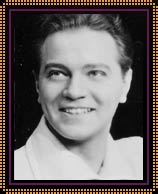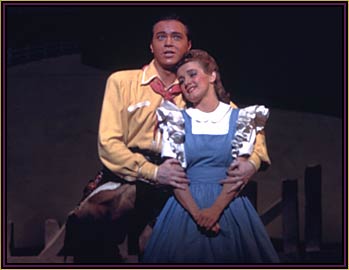 An actor, singer, director, and author, Drake will always be associated with that magical moment when the curtain rose on “Oklahoma!” at the St. James Theater in New York on March 31, 1943, and he made his entrance singing “Oh, What a Beautiful Mornin’.” The show marked a new and exciting beginning for the American musical theater, and Drake reigned as its leading male star for more than a decade. After singing in the Glee Club at Brooklyn College, he made his stage debut in July 1935 at the Adelphi Theater in New York in the chorus of “The Mikado.” A year later, he was in the chorus again, and also understudied one of the leading roles, in a City Center revival of “White Horse Inn.” In 1937 he introduced the title song in “Babes in Arms,” and was also featured in “Two Bouquets” (1938) with Patricia Morison, an actress who would later share in one of his greatest successes.
An actor, singer, director, and author, Drake will always be associated with that magical moment when the curtain rose on “Oklahoma!” at the St. James Theater in New York on March 31, 1943, and he made his entrance singing “Oh, What a Beautiful Mornin’.” The show marked a new and exciting beginning for the American musical theater, and Drake reigned as its leading male star for more than a decade. After singing in the Glee Club at Brooklyn College, he made his stage debut in July 1935 at the Adelphi Theater in New York in the chorus of “The Mikado.” A year later, he was in the chorus again, and also understudied one of the leading roles, in a City Center revival of “White Horse Inn.” In 1937 he introduced the title song in “Babes in Arms,” and was also featured in “Two Bouquets” (1938) with Patricia Morison, an actress who would later share in one of his greatest successes.

Alfred Drake as Curly and Joan Roberts as Laurey in 1943's "Oklahoma!"
From 1939-40 Drake also appeared in three Broadway revues, “One for the Money,” “The Straw Hat Revue” (with Danny Kaye), and “Two for the Show,” in which, together with Frances Comstock, he introduced the future standard, “How High the Moon.” After his magnetic performance in “Oklahoma!,” Drake co-starred with Burl Ives in Walter Kerr’s folk music tribute “Sing Out, Sweet Land” (1944), played Macheath in John Latouche and Duke Ellington’s contemporary version of “The Beggar’s Holiday” (1946), and took the role of Larry Foreman, the union organizer, in a revival of “The Cradle Will Rock” (1947). In 1948 he enjoyed what is often considered to be his greatest personal success in “Kiss Me, Kate.” Drake gave a marvelously witty and stylish performance in the role of Fred Graham, the egocentric thespian who is tormented on and off stage by his leading lady (Patricia Morison), who also happens to be his ex-wife, Lilli. His glorious lyric tenor voice delighted audiences on numbers such as “Where Is the Life That Late I Led?,” “I’ve Come to Wive It Wealthily in Padua,” and “Were Thine That Special Face.” In 1951 he turned down the leading role in “The King and I,” but played it for a time in 1953 while Yul Brynner was on holiday. Two years later he completed a hat trick of great roles when he played Hajj, the public poet in the musical version of “Kismet” (1955), for which he won New York Drama Critics, Donaldson, and Tony awards. He reprised his role in the London production and for subsequent revivals.
Alfred Drake
- "Babes in Arms"
- "Gigi"
- "Kismet"
- "Kiss Me, Kate"
- "Oklahoma!"
- Agnes de Mille
- Oscar Hammerstein II
- Lorenz Hart
- Alan Jay Lerner
- Frederick Loewe
- Cole Porter
- Jerome Robbins
- Richard Rodgers
Source: Biographical information provided by MUZE. Excerpted from the ENCYCLOPEDIA OF POPULAR MUSIC, edited by Colin Larkin. © 2004 MUZE UK Ltd.
Photo credits: Photofest and the Fred Fehl Dance Collection (University of Texas at Austin)

